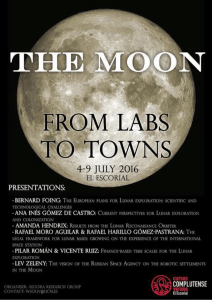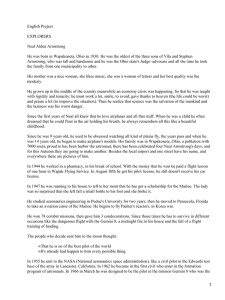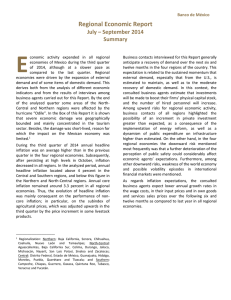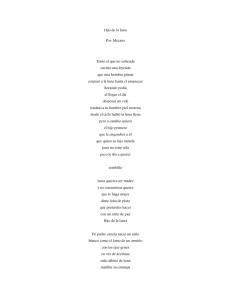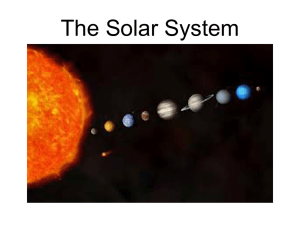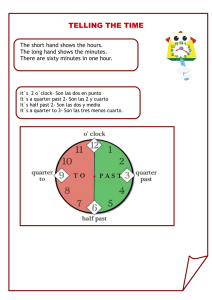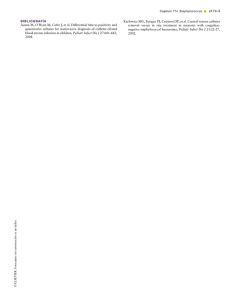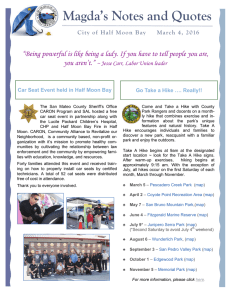CALENDAR Women astronomers who made history
Anuncio
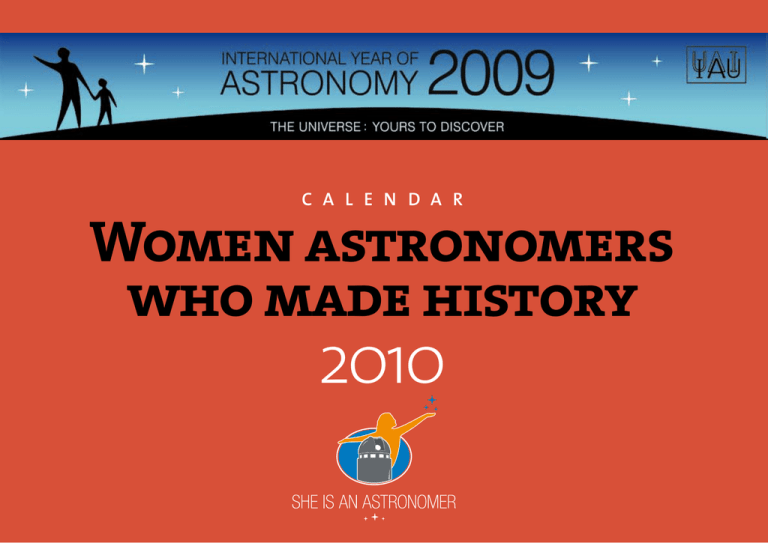
C A L E N D A R Women astronomers who made history 2010 M odern astronomy cannot be understood without the extraordinary work of all those women who, thanks to their dedication and love for science, have left us their legacy. While a well-documented history of the role of women in astronomy is scarce, various observatories and universities around the world show that many women, through their paid or unpaid work, have significantly contributed to shape our current vision of the Universe. The initiative to produce this calendar was taken by the “Ella es una Astrónoma” (“She is an astronomer”) group in Spain within the framework of the International Year of Astronomy 2009 (IYA2009). “She is an astronomer” is one of the Cornerstone Projects promoted by the International Astronomical Union and UNESCO for IYA2009. This calendar is a contribution of the Spanish team to promote equal opportunity between men and women, which is one of the United Nations Millennium Goals. We wish to promote women’s participation in all environments related to professional and amateur astronomy, and to support the training of young female researchers and technologists. Astronomy continues to attract women and benefits from their contribution, but we are far from the desired 50% participation. There is also a wide geographical diversity, with few countries having more than 25% of female astronomers and many having less than 10%. It is in our hands, men and women, to create a society that defends the principle of equal opportunity for all its members. With this calendar we aim to help reconstruct the history of women in astronomy, which, as in other fields of knowledge, is poorly known. We have highlighted exceptional women whose contributions to the advancement of science deserve to transcend anonymity and occupy a place in history. We have tried to give visibility and to value the contributions of women astronomers from different epochs and countries. Of course, the selection presented in this calendar is not exhaustive; the list does not end here. Many projects developed by “She is an astronomer” teams in different countries have expanded and will continue to expand this work to produce a more complete view of the contributions of women to the history of Astronomy. http://astronomia2009.es/Proyectos_pilares/Ella_es_una_Astronoma/ www.sheisanastronomer.org THE UNIVERSE YO URS TO DI S C OVER INTERNATIONAL YEAR OF ASTRONOMY Astronomer Hypatia of Alexandria IV-V Centuries “Hypatia far surpassed all the philosophers of her own time.” Socrates Scholasticus H ypatia was an astronomer, mathematician, and philosopher born in the IV century AD in the Egyptian city of Alexandria. She was the author of many works on astronomy, all of which have been lost. According to science historians she wrote several studies about mathematics and astronomy (e.g. about the ptolemaic tables and explanations about the Almagest). She built and improved astronomical instruments such as the “plane astrolabe”, an ancient instrument for determining the altitude of the sun and stars, and the “planisphere”, the map of celestial bodies. Historians describe her as a charismatic teacher. Many students came to Alexandria specifically to study with Hypatia, some of whom subsequently became important politicians and philosophers. She was brutally killed by a radical Christian mob, which identified her as a defender of paganism and rationality. THE UNIVERSE YOUR S TO DIS COVER January 2010 INT ERNA T IO NA L YEA R O F ASTRONOMY Sunday Monday Tuesday Wednesday Thursday 3 4 5 6 7 10 11 12 13 14 17 18 19 20 21 24 /31 25 26 27 28 Birth of Nicole Lepaute (1723) Last Quarter Friday Saturday 1 2 8 9 15 16 22 23 29 30 Death of Caroline Herschel (1848) New Moon First Quarter Birth of Paris Pismis (1911) Full Moon Astronomer Fatima of Madrid X-XI Centuries M She spent most of her life in Córdoba (Spain), the world-leading center of all knowledge at the time. uslim astronomer from the X-XI centuries, she was the daughter of the astronomer and scientist at large Maslama alMayriti, whose name means “man from Madrid”. She wrote several works, which are known as “Corrections from Fatima”. She worked with her father on her astronomical and mathematical investigations. Together, they edited and corrected “The Astronomical Tables of al-Khwarizmi”, adjusting them to the meridian passing through Cordoba and using the capital city of the Califato (a territory under the jurisdiction of a caliph) as the “center of the world”, i.e., as the reference point for all their calculations. They also worked on calendars, calculations of the true positions of the Sun, the Moon and the planets, tables of sine and tangents, spherical astronomy, astrological tables, parallaxes calculations, eclipses and Moon visibility. THE UNIVERSE YOUR S TO DIS COVER February 2010 INT ERNA T IO NA L YEA R O F ASTRONOMY Sunday Monday Tuesday Wednesday Thursday Friday 1 2 3 4 5 6 7 8 9 10 11 12 13 14 15 16 17 18 19 20 21 22 23 24 25 26 27 28 Last Quarter New Moon First Quarter Full Moon Saturday Birth of Maria Winkelmann Kirch (1670) Maria Astronomer Winckelmann Kirch 1670-1720 M The “Comet of 1702” was the first comet to be discovered by a woman. aria Winckelmann Kirch was a German astronomer who discovered the “Comet of 1702.” She made important observations and wrote many different scientific papers. Her analyses of the aurora borealis were collected in a text published in 1707, and her work on the conjunction of Jupiter and Saturn with the Sun was published in 1712. In addition, she produced calendars of astronomical events together with her husband, Gottfried Kirch, who was also an astronomer. Two of their daughters and one of their sons also dedicated themselves to astronomy. After the death of Gottfried, Maria continued working for the Berlin Academy of Science, even though she had no official appointment. THE UNIVERSE YOUR S TO DIS COVER March 2010 INT ERNA T IO NA L YEA R O F ASTRONOMY Sunday 7 14 21 28 Last Quarter Monday Tuesday Wednesday Thursday Friday Saturday 1 2 3 4 5 6 8 9 10 11 12 13 15 16 17 18 19 20 22 23 24 25 26 27 29 30 31 New Moon Birth of Caroline Herschel (1750) First Quarter Full Moon March Equinox Astronomer Nicole-Reine Lepaute 1723-1788 An asteroid and a lunar crater have been named after her. N icole-Reine Lepaute worked with another astronomer Jerome Lalande and mathematician Alexis Clairaut to compute the return date of Comet Halley. This required many calculations to determine the daily position of the comet on its orbit, taking into account the perturbations due to the giant planets Jupiter and Saturn. Her calculations made it possible to determine the dates of the next passage of the most famous comet. In 1762 she performed some calculations about the 1764 solar eclipse. She published several astronomical papers and articles, one of which reported all observations made of the Venus transit in 1761. She was born in the Luxembourg palace in Paris where her father was working for Queen Isabel of Orleans. THE UNIVERSE YOUR S TO DIS COVER April 2010 INT ERNA T IO NA L YEA R O F ASTRONOMY Sunday Monday Tuesday Wednesday 4 5 6 7 11 12 13 14 18 19 20 21 25 26 27 28 Last Quarter Death of Annie Jump Cannon (1941) New Moon First Quarter Full Moon Thursday Friday Saturday 1 2 3 8 9 10 15 16 17 22 23 24 29 30 Astronomer Caroline Lucretia Herschel 1750-1848 She discovered eight comets, three nebulae, and wrote two astronomical catalogs. B orn in Hanover, Germany, Caroline Herschel worked in the United Kingdom with her brother, William Herschel. She developed methods of exploring the night sky, helped in the construction of telescopes, studied binary star systems, and published important stellar catalogs. She was named an honorary member of the British Royal Astronomical Society and received the gold medal of science from the King of Prussia. British King George III paid her a salary of 50 British pounds, making her the first professional female astronomer in history. Before becoming an astronomer, she was a famous singer at oratory concerts. THE UNIVERSE YOUR S TO DIS COVER May 2010 INT ERNA T IO NA L YEA R O F ASTRONOMY Sunday Monday Tuesday Wednesday Thursday Friday 2 3 4 5 6 7 9 10 11 12 13 14 16 17 18 19 20 21 24 23 /30 /31 25 26 27 28 Last Quarter Birth of Cecilia PayneGaposchkin (1900) New Moon First Quarter Full Moon Death of Williamina Paton Stevens Fleming (1911) Saturday 1 8 15 22 29 Birth of Williamina Paton Stevens Fleming (1857) Astronomer Wang Zhenyi 1768-1797 C In 1994, the International Astronomical Union named a crater on Venus after her. hinese astronomer who studied lunar eclipses using models she constructed in the garden of her home. Despite her short life, Wang Zhenyi was extremely productive. She wrote twelve books on astronomy and mathematics; among them she mentions “Some observations of the forms and figures” dedicated to the positions of the stars in the sky. She described the heavens and Earth’s place in it. She also recompiled data about the weather in order to prevent and combat the draughts and floods that devastated the region. Conscious of being a privileged woman, she believed that knowledge should reach men and women equally. THE UNIVERSE YOUR S TO DIS COVER June 2010 INT ERNA T IO NA L YEA R O F ASTRONOMY Sunday Monday Tuesday Wednesday Thursday Friday Saturday 1 2 3 4 5 8 9 10 11 12 15 16 17 18 19 22 23 24 25 26 29 30 Last Quarter 6 7 13 14 20 21 27 28 June solstice Death of Maria Mitchell (1889) New Moon First Quarter Full Moon Astronomer Maria Mitchell She discovered a comet too faint to be seen with the naked eye, the Mitchell comet. M 1818-1889 aria Mitchell was the first female academic astronomer in the USA. She discovered that sunspots are whirling vertical cavities and not, as previously thought, clouds. She calculated Venus position tables for US Navy Observatory. She became the first female member of the American Academy of Arts and Sciences. In 1865, she became the first professor of astronomy at Vassar College. After some time she learned that, despite her reputation and experience, her salary was less than that of many younger male professors. She insisted on a salary increase, and got it. Mitchell co-funded the American Association for the Advancement of Women. THE UNIVERSE YOUR S TO DIS COVER July 2010 INT ERNA T IO NA L YEA R O F ASTRONOMY Sunday Monday Wednesday 4 5 6 7 11 12 13 14 18 19 20 21 25 26 27 28 Birth of Henrietta Swan Leavitt (1868) Last Quarter New Moon First Quarter Tuesday Full Moon Thursday Friday Saturday 1 2 3 8 9 10 15 16 17 22 23 24 29 30 31 Astronomer Williamina Paton Stevens Fleming 1857-1911 She discovered 10 novas, 59 gaseous nebulae and over 300 variable stars. B orn is Scotland, Fleming worked there as a teacher until she moved with her husband to the United States. With a broken marriage and pregnant, she began working as a maid for Edward Pickering, the Director of Harvard Observatory. Soon she was in charge of carefully reviewing photographic plates of the sky, some of which were of very poor quality, and obtained excellent results such as the discovery of the Horsehead Nebula. She was finally appointed as curator of the plates archive in 1898, the first institutional position in Harvard held by a woman. She immigrated to United States from Scotland in 1878. THE UNIVERSE YOUR S TO DIS COVER August 2010 INT ERNA T IO NA L YEA R O F ASTRONOMY Sunday Monday Tuesday Wednesday Thursday Friday Saturday 1 2 3 4 5 6 7 8 9 10 11 12 13 14 15 16 17 18 19 20 21 22 23 24 25 26 27 28 29 30 31 Birth of Maria Mitchell (1818) Last Quarter New Moon First Quarter Full Moon Death of Paris Pismis (1999) Astronomer Annie Jump Cannon C She determined and classified the spectra of more than 230,000 stars. 1863-1941 annon is the most wellknown of the “Pickering’s women”, the group of women hired by Harvard Observatory director Edward Pickering to make the Draper Catalog, mapping and classifying all the stars in the sky. She invented the stellar classification scheme of spectral classes O, B, A, F, G, K, M, and she gave her system a mnemonic of “Oh Be a Fine Girl and Kiss Me.” This system was adopted with very small changes by the International Astronomical Union. Her career lasted more than 40 years, during which time she classified more stars than any other person in history, male or female. She was the first woman to be given an honoris causa doctorate degree by the University of Oxford (1925). THE UNIVERSE YOUR S TO DIS COVER September 2010 INT ERNA T IO NA L YEA R O F ASTRONOMY Sunday Monday Tuesday Wednesday Thursday Saturday 1 2 3 4 8 9 10 11 15 16 17 18 22 23 24 25 29 30 Last Quarter 5 6 7 12 13 14 19 20 21 26 27 28 Friday New Moon First Quarter Full Moon September Equinox Astronomer Henrietta Swan Leavitt M Her work allowed astronomers to determine the size of our Galaxy and the scale of the Universe. 1868-1921 ember of the group of star trackers at Harvard Observatory, Leavitt discovered the periodluminosity relation, a novel method to measure the distance to astronomical objects. Leavitt found this relation after a systematic and detailed analysis of Cepheid stars. During one year (1905), she discovered 843 new variable stars in the Small Magellanic Cloud, discovering a total 2400 variables in this galaxy during her career. She also found four novae. The recognition of the importance of her scientific work came only after her death, partly because of the intention to nominate her for the 1925 Nobel prize, which was impossible as the prize can not be awarded post-mortem. Despite her contributions to astronomy, when she died her professional standing was still at the assistant level. THE UNIVERSE YOUR S TO DIS COVER October 2010 INT ERNA T IO NA L YEA R O F ASTRONOMY Sunday Monday Tuesday Wednesday Thursday Friday Saturday 1 2 8 9 15 16 22 23 29 30 Last Quarter 3 4 5 6 7 10 11 12 13 14 17 18 19 20 21 24 /31 25 26 27 28 New Moon First Quarter Full Moon Last Quarter Astronomer Cecilia Payne-Gaposchkin The verification of Einstein’s theory of relativity with the solar eclipse in 1919 stimulated Payne’s interest in astronomy. B 1900-1979 orn in Great Britain, Payne carried out her scientific work at Harvard University in the USA. Her Doctoral thesis (the first astronomy thesis ever carried out by a woman in Harvard) demonstrated that hydrogen is the main component of stars, something taken for granted nowadays but which represented a real change of paradigm in 1925. In spite of working at Harvard for almost two decades, she was not considered as an official astronomer until 1938. In 1956 she became the first female professor at Harvard. A scholarship for women in science allowed her to move to Harvard Observatory in 1923. November 2010 THE UNIVERSE YOUR S TO DIS COVER INT ERNA T IO NA L YEA R O F ASTRONOMY Sunday Monday Tuesday Wednesday Thursday Friday Saturday 1 2 3 4 5 6 8 9 10 11 12 13 15 16 17 18 19 20 22 23 24 25 26 27 29 30 New Moon 7 14 21 28 Full Moon Last Quarter First Quarter Astronomer Paris Pismis With a profession that lasted more than 50 years, Pismis published over 100 scientific papers. A 1911-1999 n Armenian born in Istanbul, Pismis was the first woman to attend university in Turkey, obtaining a degree in mathematics in 1937. When she moved to Mexico in 1942 she became the first person, male or female, to become a professional astronomer in Mexico. She worked at the National Astronomical Observatory of Tacubaya, part of the Autonomous National University of Mexico (UNAM in Spanish). There she started teaching the first official classes in astronomy in Mexico. Pismis died on 1 August 1999, leaving as a legacy a community of over a hundred of astronomers currently working at UNAM. She discovered 20 open clusters and 3 globular clusters and worked on the first explanations for the spiral structure of galaxies. Originally from Turkey, she met her husband at Harvard Observatory, with whom she moved to Mexico. December 2010 THE UNIVERSE YOUR S TO DIS COVER INT ERNA T IO NA L YEA R O F ASTRONOMY Sunday Monday Tuesday 5 6 7 12 13 14 19 20 21 26 27 28 Death of Cecilia PayneGaposchkin (1979) New Moon Death of Henrietta Swan Leavitt (1921) First Quarter Full Moon Last Quarter Wednesday Thursday Friday Saturday 1 2 3 4 8 9 10 11 15 16 17 18 22 23 24 25 29 30 31 Birth of Annie Jump Cannon (1863) December Solstice Death of Maria Winkelmann Kirch (1782) THE UNIVERSE YO UR S TO DISCOVER INTERNATIONAL YEAR OF ASTRONOMY Produced by “Ella es una astrónoma” in Spain. Francesca Figueras (Universidad de Barcelona, coordinator) Adriana Kiczkowski (Consultant) Josefina Ling (Universidad de Santiago de Compostela, coordinator of the calendar project) Belén López Martí (Laboratorio de Astrofísica Estelar y Exoplanetas-Centro de Astrobiología (LAEX-CAB/INTA-CSIC)) Isabel Márquez (Instituto de Astrofísica de Andalucía, CSIC) Josefa Masegosa (Instituto de Astrofísica de Andalucía, CSIC) Eulalia Pérez Sedeño (Centro de Ciencias Humanas y Sociales, CSIC) Blanca Troughton (Sociedad Malagueña de Astronomía) Montserrat Villar Martín (Instituto de Astrofísica de Andalucía, CSIC) Produced by Explora proyectos s.l. Designed by Ana Gueller Pictures by Eulogia Merle English translation by “She is an Astronomer” members Maria Lugaro, Montserrat Villar Martin, Francesca Primas, Pat Knezek, Gloria Dubner, and Sarah Maddison.
